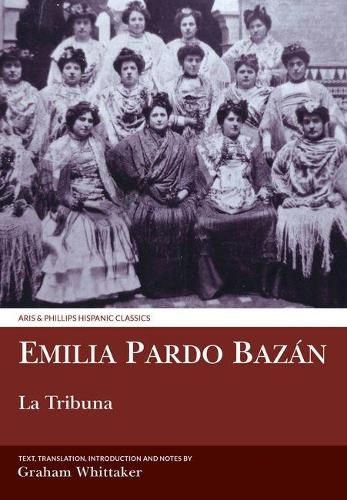Readings Newsletter
Become a Readings Member to make your shopping experience even easier.
Sign in or sign up for free!
You’re not far away from qualifying for FREE standard shipping within Australia
You’ve qualified for FREE standard shipping within Australia
The cart is loading…






Emilia Pardo Bazan was born in the Galician town of A Coruna into a noble family who nurtured her lifelong thirst for knowledge. She is undoubtedly the most controversial, influential and prolific Spanish female writer of the nineteenth century, publishing a vast number of essays, social commentaries, articles, reviews, poems, plays, novels, novellas and short stories.
Her third novel, La Tribuna, heralds a new age in Spanish literature, a naturalist work of fiction that examines the situation of contemporary women workers. The author’s preparation for the novel involved reading and consulting contemporary pamphlets and newspapers, as well as spending two months in a Galician tobacco factory observing and listening to conversations. This method, common in English writers like Dickens and frequently adopted in France by the masters of Realism, was almost unprecedented in Spain.
Set against a background of turmoil and civil unrest, La Tribuna reflects the author’s interest in the position of women in Spanish society. The working-class heroine, Amparo, develops from a shapeless, apolitical street urchin into a masterpiece of femininity, a charismatic orator who becomes a ‘tribune’ of the people. At the same time, however, she allows herself to be seduced by a prosperous middle-class youth whose promises prove to be just as empty as the revolutionary slogans in which she believes so fervently.
$9.00 standard shipping within Australia
FREE standard shipping within Australia for orders over $100.00
Express & International shipping calculated at checkout
Emilia Pardo Bazan was born in the Galician town of A Coruna into a noble family who nurtured her lifelong thirst for knowledge. She is undoubtedly the most controversial, influential and prolific Spanish female writer of the nineteenth century, publishing a vast number of essays, social commentaries, articles, reviews, poems, plays, novels, novellas and short stories.
Her third novel, La Tribuna, heralds a new age in Spanish literature, a naturalist work of fiction that examines the situation of contemporary women workers. The author’s preparation for the novel involved reading and consulting contemporary pamphlets and newspapers, as well as spending two months in a Galician tobacco factory observing and listening to conversations. This method, common in English writers like Dickens and frequently adopted in France by the masters of Realism, was almost unprecedented in Spain.
Set against a background of turmoil and civil unrest, La Tribuna reflects the author’s interest in the position of women in Spanish society. The working-class heroine, Amparo, develops from a shapeless, apolitical street urchin into a masterpiece of femininity, a charismatic orator who becomes a ‘tribune’ of the people. At the same time, however, she allows herself to be seduced by a prosperous middle-class youth whose promises prove to be just as empty as the revolutionary slogans in which she believes so fervently.